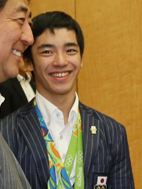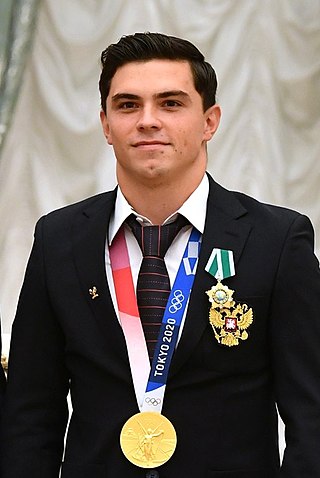
Marian Drăgulescu is a former Romanian artistic gymnast. During his senior gymnastics career he won 31 medals at Olympic Games at World and European Championships, of which eight are gold medals at the World Championships and ten are gold medals at European Championships. Drăgulescu's strongest events were vault and floor, on which he was a multiple world champion and Olympic medalist. The handspring double front somersault with ½ turn is named after him in the Code of Points. In the all-around, Drăgulescu was the European champion (2004) and bronze medalist (2000) and placed 8th at the 2004 Olympic Games.

The men's vault competition was one of eight events for male competitors of the artistic gymnastics discipline contested in the gymnastics at the 2004 Summer Olympics in Athens. The qualification and final rounds took place on August 14 and August 23 at the Olympic Indoor Hall. There were 79 competitors from 30 nations, with nations competing in the team event having up to 5 gymnasts and other nations having up to 2 gymnasts. The event was won by Gervasio Deferr of Spain, the third man to successfully defend an Olympic title in the vault and sixth man to win multiple medals of any color. Latvia and Romania each earned their first men's vault medals, with Evgeni Sapronenko's silver and Marian Drăgulescu's bronze, respectively.
Ri Se-gwang is a retired North Korean artistic gymnast, representing the April 25 Sports Club. He is often considered a specialist on vault apparatus in the sport of men’s artistic gymnastics (MAG).

The men's vault competition at the 2008 Summer Olympics was held on August 9 and 18 at the Beijing National Indoor Stadium. The eight competitors with the highest scores in qualifying, among the gymnasts electing to make two vaults, proceeded to the men's vault finals. There, each gymnast performed two vaults; the scores from the final round determined final ranking. There were 16 competitors from 13 nations that made a second vault attempt. The event was won by Leszek Blanik of Poland, the nation's first victory in the men's vault. Blanik was the seventh man to win multiple medals in the event, adding to his 2000 bronze. France earned its first medal in the event with Thomas Bouhail's silver. Anton Golotsutskov of Russia took bronze, putting the nation back on the podium after a one-Games absence.

Kōhei Uchimura is a retired Japanese artistic gymnast. He is a seven-time Olympic medalist, winning three golds and four silvers, and a 21-time World medalist.

The 2011 World Artistic Gymnastics Championships were held in Tokyo, Japan, from October 7–16, 2011, at the Tokyo Metropolitan Gymnasium. Due to uncertainty over the nuclear situation following the 2011 Tōhoku earthquake and tsunami, the International Federation of Gymnastics revealed it was considering moving the event, but on May 22 FIG president Bruno Grandi announced that the World Championships would take place in Tokyo as planned.

The men's artistic gymnastics individual all-around competition at the 2012 Summer Olympics was held at the North Greenwich Arena on 28 July and 1 August 2012. It included 41 competitors from 27 nations.

Denis Mikhailovich Ablyazin is a Russian artistic gymnast. Ablyazin is Olympic Champion 2020 in Tokyo and a seven-time Olympic Games medalist. At the 2012 London Olympics he won silver in vault and bronze in floor. At the 2016 Rio de Janeiro Olympics, he won silver with the Russian men's team, a silver in vault and bronze in rings.

Kenzō Shirai is a Japanese men's former athlete of artistic gymnastics (AG). Born in Yokohama, Kanagawa, he, a graduate of Kishine High School, joined the Nippon Sport Science University (Nittaidai). Shirai took the team gold, and a bronze on individual vault with the Japanese men's AG (MAG) national team at the 2016 Summer Olympics (OG) in Rio de Janeiro while more major wins were from the World Championships (WC).

Nikita Vladimirovich Nagornyy is a Russian artistic gymnast and two-time Olympian, representing Russia in 2016 and ROC in 2020. He was part of the teams who won gold at the 2020 Olympic Games and 2019 World Championships and silver at the 2016 Olympic Games and 2018 World Championships.

The men's artistic individual all-around competition at the 2016 Summer Olympics was held on 6 and 10 August 2016 at the HSBC Arena. Kōhei Uchimura won gold, becoming the first male gymnast in 44 years to do this in two successive Olympic Games. Uchimura also became the second man to earn three all-around medals, matching countryman Sawao Kato with two golds and one silver. Uchimura's victory was Japan's sixth in the men's all-around, tying the Soviet Union for most all-time. His margin of victory was only 0.099, which was less than one small step on landing in terms of gymnastic scoring. It was also his eighth consecutive victory at the top competition of the year. Oleg Verniaiev's silver was Ukraine's first medal in the event since 2000. Max Whitlock's bronze was Great Britain's first since the 1908 Games in London.

The men's pommel horse competition at the 2016 Summer Olympics was held at the HSBC Arena on 6 and 14 August. There were 71 competitors from 36 nations. The event was won by Max Whitlock of Great Britain, the nation's first gold medal in the men's pommel horse. The nation finished 1–2 in the event, with Louis Smith repeating as silver medalist. It was the first time any nation had earned the top two spots in the event since the Soviet Union swept the medals in 1952. Smith was the second man to win three medals in the event, while Whitlock was the 11th to win two medals.

The men's rings competition at the 2016 Summer Olympics was held at the HSBC Arena on 6 and 15 August. There were 70 competitors from 34 nations. The event was won by Eleftherios Petrounias of Greece, the nation's first medal in the men's rings since 2004. Defending champion Arthur Zanetti of Brazil finished second, making him the 13th man to win multiple medals in the event. Denis Ablyazin earned Russia's first post-Soviet medal in the event with his bronze.

The men's parallel bars competition at the 2016 Summer Olympics was held at the HSBC Arena on 16 August. There were 67 competitors from 33 nations. The event was won by Oleg Verniaiev of Ukraine, the nation's first victory in the parallel bars since 2004 and third overall. Danell Leyva won the United States' first medal in the event since 1996 with his silver; David Belyavskiy's bronze was Russia's first medal in the parallel bars since 2000. China's four-Games podium streak in the event ended.

The men's horizontal bar competition at the 2016 Summer Olympics was held at the HSBC Arena on 6 and 16 August. There were 71 competitors from 34 nations. The event was won by Fabian Hambüchen of Germany, the nation's first victory in the horizontal bar since 1996 and third overall. Danell Leyva won the United States' third silver medal in four Games in the event; Nile Wilson's bronze was Great Britain's first-ever medal in the horizontal bar.

Artur Grachyevich Dalaloyan born 26 April 1996 is a Russian artistic gymnast who represented ROC at the 2020 Summer Olympics. He was part of the teams who won gold at the 2020 Olympic Games and 2019 World Championships and silver at the 2018 World Championships. Individually Dalaloyan is the 2018 World All-Around Champion and the 2019 World All-Around silver medalist. He is a nine-time World medalist and a five-time European champion.

The men's artistic individual all-around event at the 2020 Summer Olympics was held on 24 and 28 July 2021 at the Ariake Gymnastics Centre. Approximately 70 gymnasts from 35 nations competed in the all-around in the qualifying round.

The men's vault event at the 2020 Summer Olympics was held on 24 July and 2 August 2021 at the Ariake Gymnastics Centre. Unlike the other apparatus events, vault requires gymnasts to perform two exercises in order for results to count towards the vault final; most of the gymnasts perform only one or none. Approximately 20 gymnasts from 15 nations competed two vaults in the qualifying round.

The men's floor event at the 2020 Summer Olympics was held on 24 July and 1 August 2021 at the Ariake Gymnastics Centre. Approximately 70 gymnasts from 35 nations competed on floor in the qualifying round.

The men's horizontal bar event at the 2020 Summer Olympics was held on 24 July and 3 August 2021 at the Ariake Gymnastics Centre. Approximately 70 gymnasts from 35 nations competed on the horizontal bar in the qualifying round.














